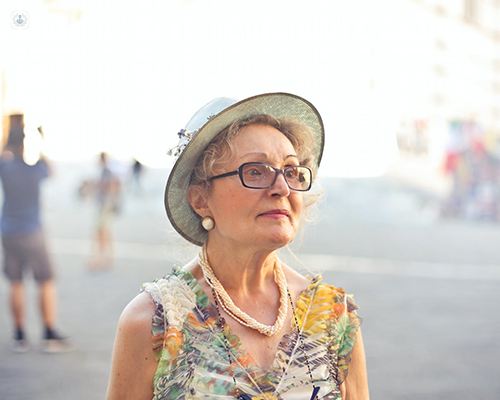Can gene therapy cure age-related macular degeneration (AMD)?
Written in association with:Age-related macular degeneration (AMD) can occur in both eyes and can lead to impaired vision. Whilst the condition isn’t painful, symptoms may include seeing straight lines as wavy, colours appearing less bright and seeing things that aren’t there.
Gene therapy is a technique that uses genes to treat or prevent disease. Currently, there are clinical trials underway to see how effective gene therapy might be for treating AMD. We’ve asked one of our top ophthalmologists Mr Praveen Patel what the future of treatment for the eye disease looks like and whether gene therapy can help.

What is age-related macular degeneration?
In my previous articles, I have written about age-related macular degeneration (AMD) to help explain our understanding of what causes this disease and potential treatments.
There are early and late forms of AMD and whilst early AMD doesn’t necessarily cause symptoms, the two forms of late (wet and dry AMD) can lead to irreversible sight loss. There are over 600,000 people in the UK living with AMD and treatment and prevention of AMD remains a public health priority. Effective treatments for wet AMD have been available for the past 10-12 years but there are currently no effective treatments for dry AMD.
For more details about AMD, please read my other articles and information from the Macular Society.
What is gene therapy?
Genes are found in cells in the body and contain the information or instructions needed to pass on information about physical and other characteristics to the next generation. Genes can also pass on and increased or decreased risk of developing a particular disease. Gene therapy is a technique which uses genes to treat or prevent disease.
You can find more information on the Moorfields hospital website here.
How can gene therapy be used to cure AMD?
There are several approaches to use gene therapy to cure AMD. One approach, which hit the headlines in 2019, uses copies of genes developed by Gyroscope Therapeutics to reduce inflammation associated with dry AMD.
This approach is currently being evaluated in clinical trials. If proven to be successful, this could slow or stop the degeneration of the light-detecting cells, which is one of the hallmarks of dry AMD.
This approach uses surgery to inject or insert liquid containing the new gene into the retina where it can have its effect.
Another approach hit the headlines a couple of weeks ago in October 2020. This approach uses genes which code for a light-sensing protein which could be inserted into cells in the retina. This approach (called optogenetics) is currently being tested in mice and is not yet ready for human clinical trials.
Here is the scientific paper which has more details about the breakthrough.
Is gene therapy for AMD available for patients in 2020?
In short, the answer is no. Gene therapy is still an experimental approach for treating AMD and is being tested in clinical trials. More research is needed to find out if it is a safe and effective treatment for AMD.
Gene therapy has however been introduced as an NHS treatment for poor vision and sight loss in children and young adults due to defects in the RPE65 gene, part of a family of inherited eye disorders called Leber's congenital amaurosis.
This gene therapy treatment is called Luxturna® and it is the first gene therapy approved for patients with eye disease.
Mr Patel specialises in treating AMD! You can book an appointment with him via his Top Doctor’s profile here.


